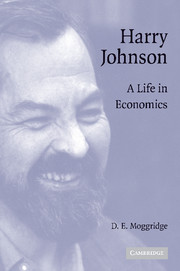Book contents
- Frontmatter
- Contents
- Photographs and Drawings
- HARRY JOHNSON
- Introduction
- 1 Toronto
- 2 Antigonish
- 3 England
- 4 North American Postgraduate
- 5 Cambridge Don
- 6 Cambridge Economist
- 7 Manchester
- 8 Chicago
- 9 Canada, Economic Nationalism, and Opulence, 1957–1966
- 10 Chicago: Money, Trade, and Development
- 11 LSE
- 12 Professional Life – Largely British
- 13 Money and Inflation
- 14 The International Monetary System
- 15 Harry's “Wicksell Period”
- 16 Stroke and After
- 17 Conclusion
- Sources
- Index
- Plate section
10 - Chicago: Money, Trade, and Development
Published online by Cambridge University Press: 04 December 2009
- Frontmatter
- Contents
- Photographs and Drawings
- HARRY JOHNSON
- Introduction
- 1 Toronto
- 2 Antigonish
- 3 England
- 4 North American Postgraduate
- 5 Cambridge Don
- 6 Cambridge Economist
- 7 Manchester
- 8 Chicago
- 9 Canada, Economic Nationalism, and Opulence, 1957–1966
- 10 Chicago: Money, Trade, and Development
- 11 LSE
- 12 Professional Life – Largely British
- 13 Money and Inflation
- 14 The International Monetary System
- 15 Harry's “Wicksell Period”
- 16 Stroke and After
- 17 Conclusion
- Sources
- Index
- Plate section
Summary
Money
During his first year in Chicago Harry received two invitations that were firmly to establish him as a more important figure in monetary economics. The first was from Paul Samuelson, president-elect of the American Economic Association:
I should like to invite you to give a substantial paper, if you have some suitable topic in mind. … No particular topics occur to me beyond the one I mentioned earlier. A provocative discussion of monetary policies here and there might be suitable. The issues connected with a low and high pressure economy might also suggest themselves. Or perhaps you have some unified research that you would like to report on.
(Box 31, Correspondence to 1963, S–Z, from P. A. Samuelson, 29 January 1960)In his 1969 and 1974 memoirs Harry reported that Samuelson suggested the topic on which he eventually spoke in St. Louis, “The General Theory After Twenty-Five Years.” If Samuelson did so no record survives. The second was an invitation from B. F. Haley, the managing editor of the American Economic Review, to prepare one of the Rockefeller Foundation–financed surveys of economic theory jointly sponsored by the American Economic Association (AEA) and the Royal Economic Society. His topic would be “Monetary Theory and Policy” (Box 25, AEA Survey, from B. F. Haley, 3 March 1960). Harry hesitated before replying. In particular he wanted to know what his teaching responsibilities would be at Chicago during the 1960–1 academic year.
- Type
- Chapter
- Information
- Harry JohnsonA Life in Economics, pp. 242 - 275Publisher: Cambridge University PressPrint publication year: 2008



